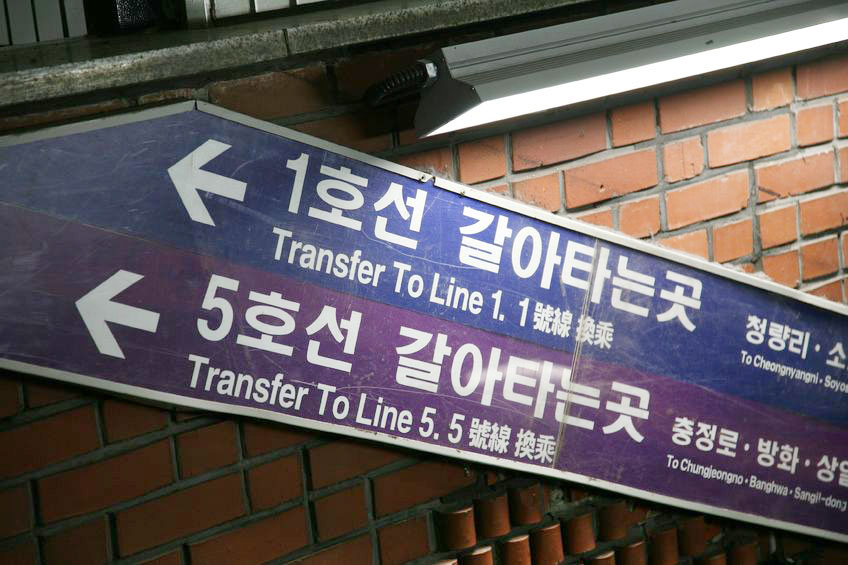
Signs in Seoul’s Metropolitan Subway. Photo © Sung Kuk Kim/123rf.
We might as well get the bad news out of the way first: learning Korean is not easy. Experts rank the country’s national language right up there with head-scratchers like Chinese, Japanese, and Arabic in terms of the amount of study required to attain fluency. It has been linked to everything from Hungarian to Japanese, yet academics still disagree on how to classify it. Throw in a unique script, multiple levels of formality, and for Westerners, alien grammar, and it’s apparent why very few non-Koreans attain fluency. How much Korean you’ll need depends on where you work and live—those in smaller local firms or towns, for example, will find the lack of language ability more of an issue than someone working for a multinational in Seoul.The good news is that fluency doesn’t have to be anyone’s goal. English is now a core component of the education system (and at the center of a massive tutoring craze) so most South Koreans now have at least a passing knowledge of the language. Many important businesses and government departments have made an effort to set up departments providing services in English and other major languages, and many more can rustle up an English speaker to assist if needed, particularly in cities like Seoul and Busan. There’s also no shortage of English speakers in the workplace, especially where expatriates are likely to be employed.Of course, Korean is the national language, and regardless of what foreign residents do or where they choose to live, they’ll have to resort to whatever Korean they’ve picked up at some point. Korean fluency may not be realistic, but Korean functionality certainly is. Hangul, the Korean script, is remarkably logical and can be picked up after a few days of study. There are no tones to contend with, and many articles or grammar points can be dropped in everyday speech without risking any misunderstanding. A few simple phrases and words will be enough to engage in small talk and handle common shopping, dining, and travel situations. For the most part South Koreans are delighted with and supportive of any attempts to speak their language—indeed the chief danger is that they’ll mistake your fumbling attempts for fluency and start rattling off all kinds of sentences you have no hope of understanding.
How much Korean you’ll need depends on where you work and live—those in smaller local firms or towns, for example, will find the lack of language ability more of an issue than someone working for a multinational in Seoul. Those content with “survival” Korean can usually get by with a bit of self-study, for which there’s a wide range of books and Internet-based classes available, or a couple of hours per week of being tutored or language exchange sessions.
Those who have set Korean proficiency as a goal—usually long-term residents or those with serious local business interests—will require more intensive learning, either through private tutors or institutes or via one of the excellent language courses available at local universities. These involve a substantial amount of work but produce definite results and can often be fit around a typical executive’s schedule.
Excerpted from the Second Edition of Moon Living Abroad in South Korea.